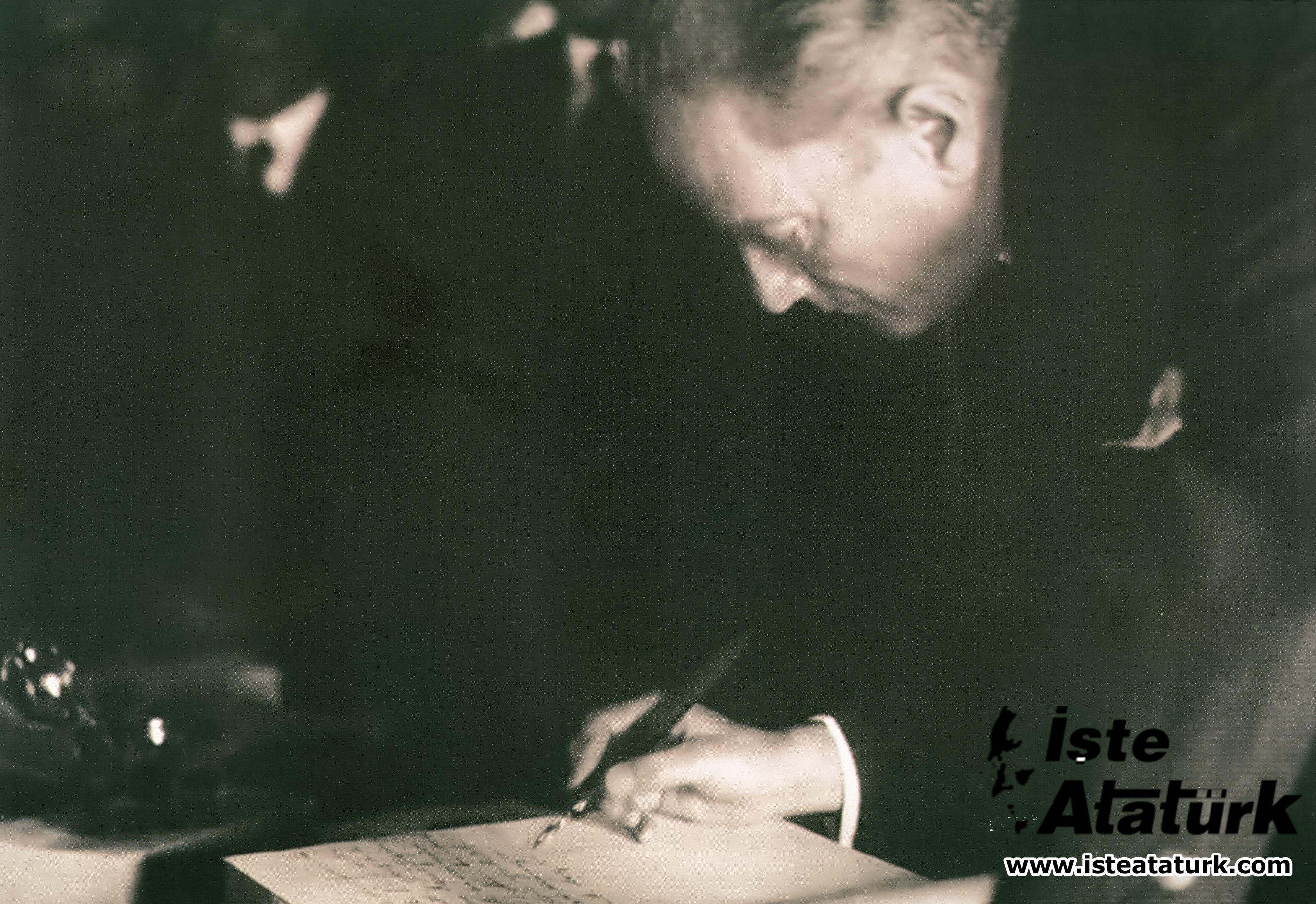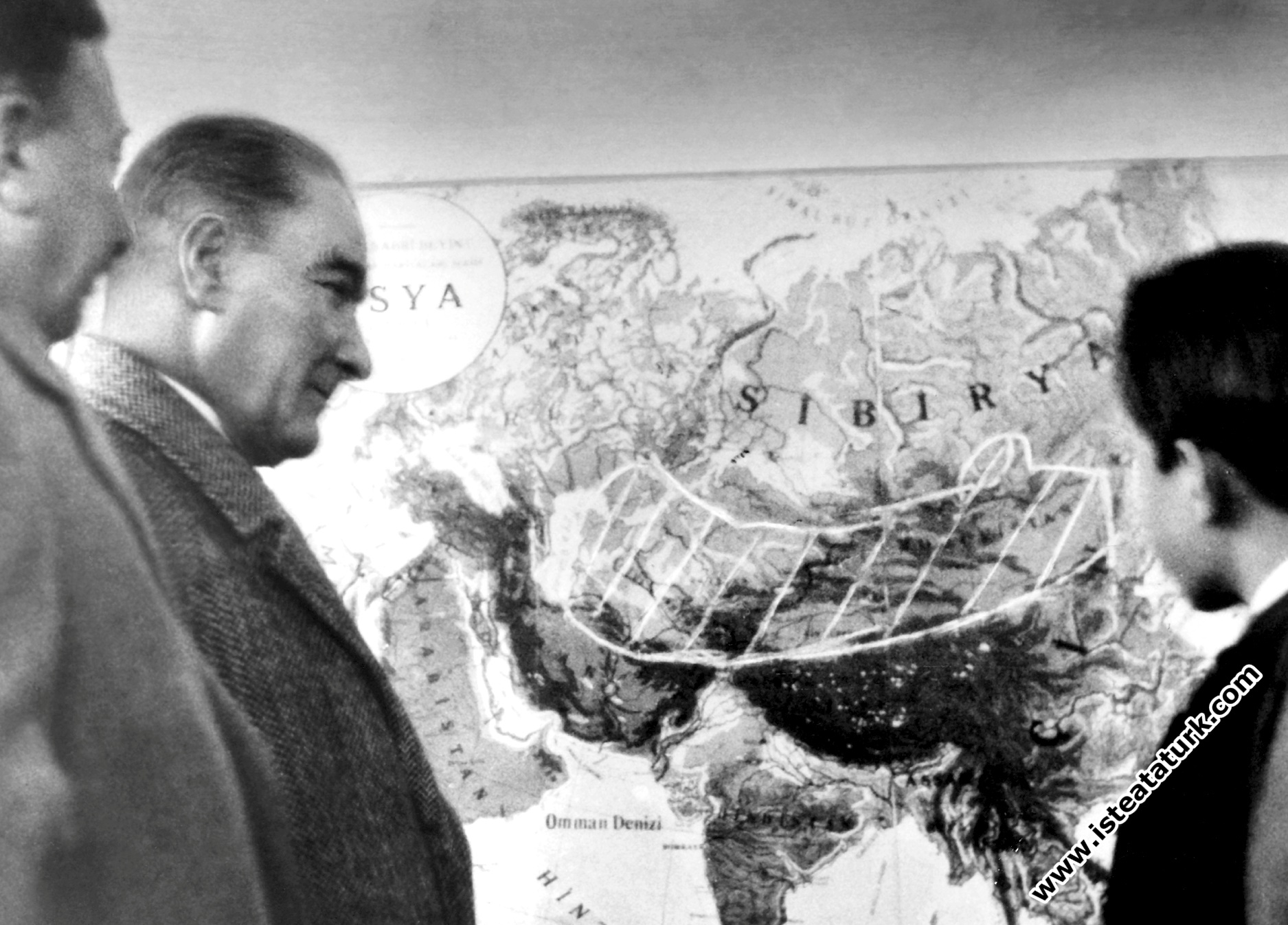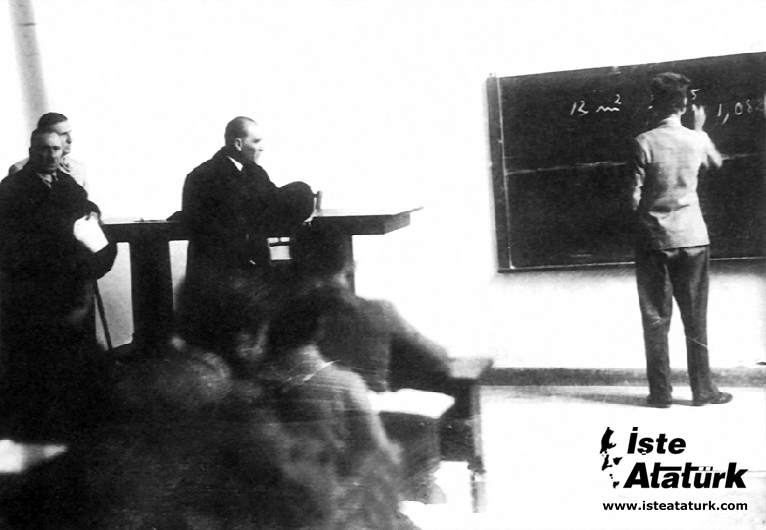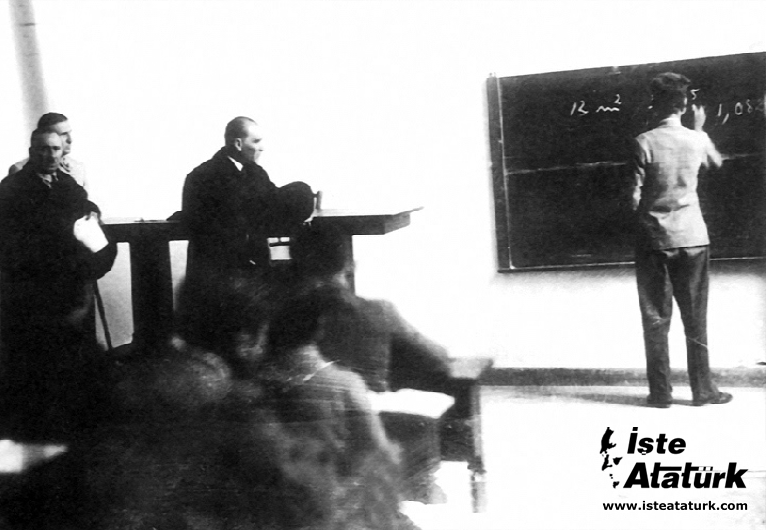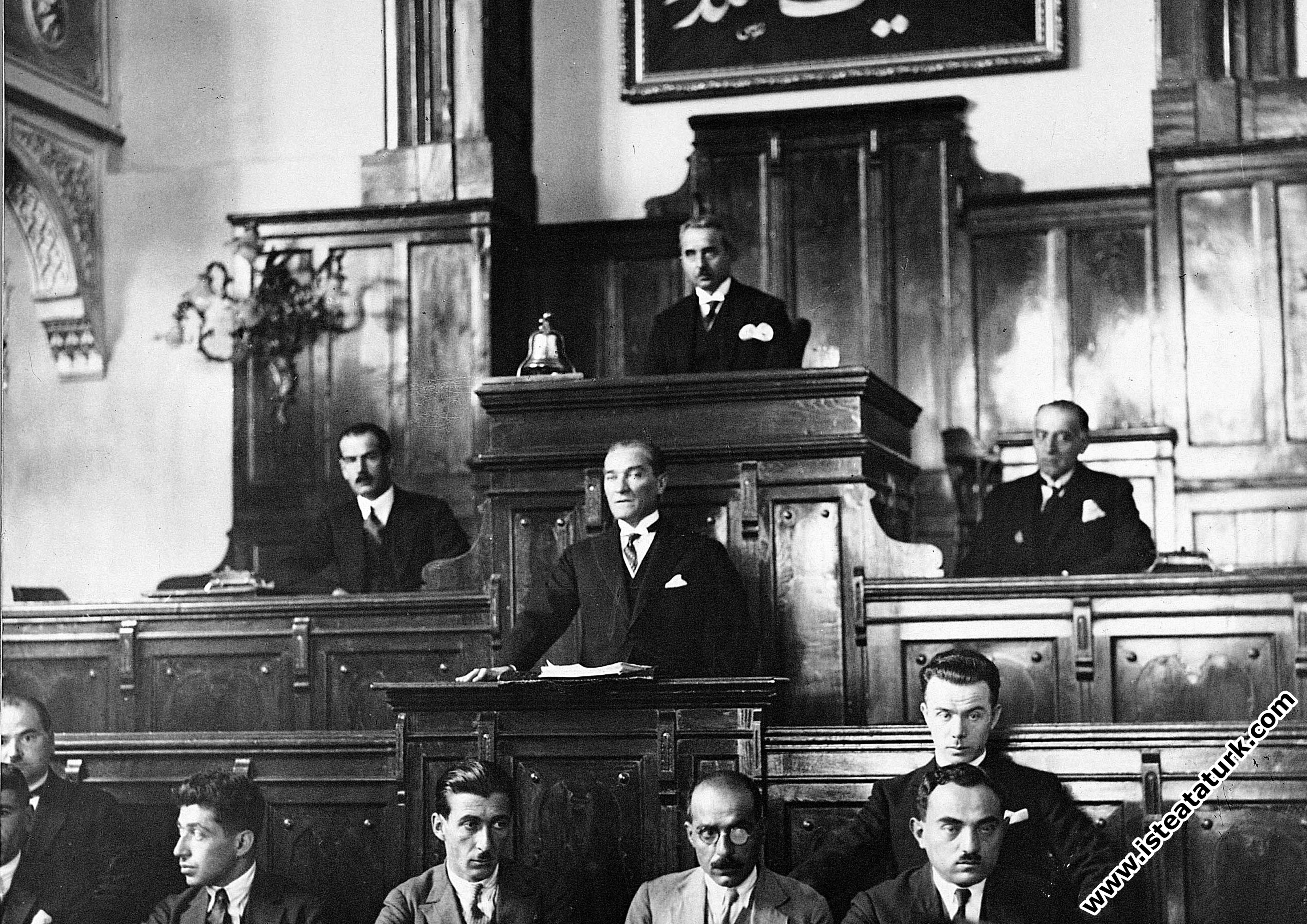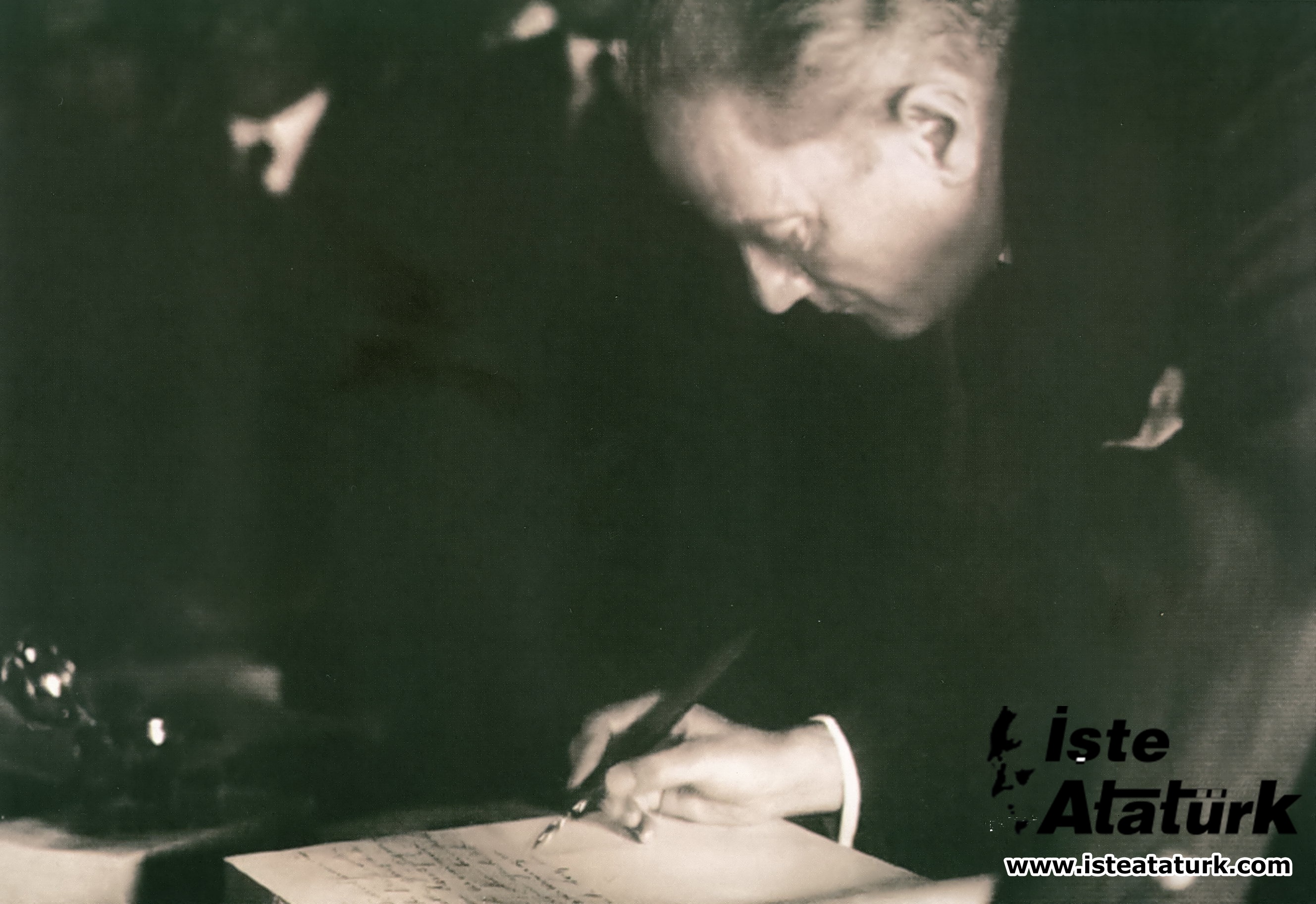
The Universality of the Turkish Revolution
Character Size
“Because the character of the Turkish Nation is high. Turkish people are hardworking. Turkish people are smart. Because the Turkish Nation knew how to overcome difficulties with national unity and solidarity. And because the torch that the Turkish Nation holds in their hands and minds on the path of progress and civilization on which they are walking is positive science”. Mustafa Kemal Ataturk
THE UNIVERSALITY OF THE TURKISH REVOLUTION
The Turkish Nation, under the leadership of its eternal leader Mustafa Kemal Atatürk, fought for independence when it was on the verge of extinction and was successful in this. By accepting the contemporary values and principles of the West, he transformed the revolution into an ideology of modernization1. This revolution, as well as being a social movement that will take the Turkish Nation to the level of contemporary civilizations, has also been an outstanding example and a source of hope for many societies with its universal aspects. When the "Universality of the Turkish Revolution" is mentioned, it is seen that the issue is important in two ways. The first of these is that the Kemalism Ideology, which we call the "Ataturkist Thought System", takes science as a guide and, moreover, adopts contemporary western values; In fact, it is a systematization with its principles2. Secondly, besides the Turkish Nation's adoption of new and contemporary values,
In the Turkish Revolution, many contemporary concepts with a universal character gained qualities that would be the reason for the existence of the Turkish Nation. Concept of national sovereignty, rule of law, constitution, secular state structure, political parties, etc., are some of these concepts. Each of these concepts gains its real meaning as a result of the comparison of the new Turkish State with the Ottoman State in all aspects; The difference between the old Ottoman Empire and the new Turkey emerges. These are the concepts that the western world has been working on for centuries and enriching its political content. In the comparison of the eastern world and the western world, it is seen that the concepts developed by the west and strengthened its political content emerge as contemporary and universal values4. Therefore, the goal of modernization in Kemalism, showed itself in parallel with westernization. As a matter of fact, Atatürk told Maurice Pernot, one of the French journalists, as early as 1923: “We want to modernize our country. All our efforts are to create a modern, therefore western, government in Turkey. Which nation wanted to enter civilization but did not turn to the west?” p.
With these words, Atatürk thought of joining the modern world civilization and being an honorable member of it, and by adjusting his attitudes and behaviors in social, political and cultural life according to civilized standards, to give the Turkish Nation its rightful place among advanced and modern nations. He has turned his great purpose in this direction. In a speech he gave to his nation in 1923, he explained his aim with the following sentences: “The country will definitely be modern and innovative. For us, this is a case of life. The results of all our sacrifices depend on this”.
As it is seen, Atatürk accepts the Turkish Revolution as a political, social and cultural movement that aims to transform the Turkish Nation into a western society. So what is the Turkish Revolution? Atatürk explained the answer to this question at the opening of Ankara Law School on November 5, 1925, with the following sentences: “What is the Turkish Revolution? This revolution, apart from the revolutionary meaning that the word brings to mind at the first moment, expresses a wider change than it. The shape of our state today has been the most advanced form that has eliminated the forms that have been coming for centuries. In order to maintain the existence of the nation, the common bond between its members has changed its form and content for centuries; that is, the nation gathered its individuals with the bond of Turkish nationality instead of religious and sectarian bonds. People,
These mentioned issues are not the results of the historical accumulation or in other words the historical evolution of an eastern society. Since the eastern societies were closed to the contemporary values of the west and technological developments based on these values, they could not overcome the principle of ummahism, they were also behind in terms of not being able to protect their full independence, awakening national feelings and taking their free will into their hands. What made the Western world modern was its mental structure and rational way of thinking8. It is also known that with the Renaissance and Reform movements, Europe experienced a period of enlightenment in all matters, individualism strengthened, and social solidarity and social unity feelings developed. Reaching national borders, tending towards the understanding of full independence, valuing national sovereignty, adopting the principles of separation of powers and democratic order, They have become contemporary values that have been patiently acquired in the course of history. It has also been seen that eastern societies did not experience these and could not reach the level of social knowledge and skills to achieve them. As a result, with the dominance of the west over the east, it has been witnessed that eastern societies have become colonial societies. Historical events bear witness to the fact that the Ottoman Empire was dragged towards the same fate. Right after the end of the First World War, the Turkish Nation under the leadership of Mustafa Kemal Atatürk both fought against the western colonial powers and witnessed the multifaceted struggle of this nation to acquire contemporary values that became the common property of humanity9. As a result, with the dominance of the west over the east, it has been witnessed that eastern societies have become colonial societies. Historical events bear witness to the fact that the Ottoman Empire was dragged towards the same fate. Right after the end of the First World War, the Turkish Nation under the leadership of Mustafa Kemal Atatürk both fought against the western colonial powers and witnessed the multifaceted struggle of this nation to acquire contemporary values that became the common property of humanity9. As a result, with the dominance of the west over the east, it has been witnessed that eastern societies have become colonial societies. Historical events bear witness to the fact that the Ottoman Empire was dragged towards the same fate. Right after the end of the First World War, the Turkish Nation under the leadership of Mustafa Kemal Atatürk both fought against the western colonial powers and witnessed the multifaceted struggle of this nation to acquire contemporary values that became the common property of humanity9.
The point to be emphasized here is that the Turkish Revolution adopted not the imperialist values of the west, but the contemporary values that have become the property of humanity. The French Revolution, which demolished the kingdom and many outdated institutions that supported it, brought the republican regime, adopted the contemporary concepts developed by the Enlightenment Period in social and political life, and brought them into operation in the state structure, has a special importance in terms of influencing the Turkish Revolution. As a matter of fact, the eternal leader Atatürk, as the first president of the new Republic of Turkey, emphasized the importance of the French Revolution in a statement he gave to a reporter of Le Matin newspaper and published in the newspaper Hakimiyet-i Milliye on March 8, 1928, and expressed the relationship between this revolution and the Turkish Revolution with the following sentences: He explained: “The French Revolution spread the idea of freedom to the whole world. But since then, humanity has progressed. Turkish democracy followed the path opened by the French Revolution, but developed in a distinctively distinctive way. Because each nation makes its revolution according to its situation and position, which depends on the pressure and needs of the social environment, and the time of this revolution and revolution.
The French Revolution brought with it modern values of a universal nature, that many world societies apart from the French society were affected by these principles, thus changing the course of world history; We know that with the development of the idea of independence and freedom in parallel with the concept of political borders, societies have acquired new principles reinforced by these concepts and turned to brand new ideals. The wars of independence and freedom of Latin American societies against Portugal and Spain, the emergence of national wars against the monarchy regimes and their understanding of the state in Europe, the constitution and freedom movements, are the new developments caused by the universal French Revolution. Atatürk, who made reading and learning a passion, We should also know that books about world history occupy a great place among the books he reads, and that he has carefully read the books about the French Revolution, among them12; Naturally, he learned a lot from this revolution and saw that this revolution was the cradle of many concepts that spread and influenced the world. Moreover, Atatürk is not a person who only reads and is content with what he has learned; He is a person who can synthesize what he has learned13. In a speech he gave during the most critical days of the War of Independence, during his participation in a ceremony held at the French representative office in Ankara on 14 July 1922, due to the anniversary of the French Revolution: “July 14 is the national holiday of the French Nation; It is the holiday of all nations with the love of independence” and continued as follows: “If the wronged Asian and African nations have learned a lesson from our struggle for independence, they will take this path, even if it costs them dearly. For a nation that lacks freedom and independence, life has neither meaning nor pleasure. Gentlemen! Our drive to Asia in revolt is no less powerful and no less logical than the causes of the French Nation to heroic actions”14.
There is no doubt that the idea of independence and freedom, which Atatürk talked about and defended, explains a national understanding based on the principle that societies attain their own selves and political identities. Because, according to Atatürk, nationalism as an unchanging principle is essential. For this reason, around the old Ottoman dynasty, people from different ethnic origins, around the sense of political unity, developed an understanding of independence against the colonial western states and a joint reaction method based on religion, even during the opening of the parliament, the people coming from Syria and Iraq. refused by the delegations. He proposes the sense of national unity and the understanding of independence, which the French Revolution gives its modern meaning, to these delegations who want a joint struggle with Turkey against its imperialism15.
Atatürk, who emerged victorious from a very tough war by leading his nation to independence through the path opened by the French Revolution, made his country independent and his people free. He thought that the struggle of the Turkish Nation would not remain only within the borders of Turkey, but that it was a universal movement that would push the oppressed Asian and African nations to the war of independence. As a matter of fact, after the Turkish War of Independence, the wars of independence against colonialism, which was considered invincible by the third world societies until that time, were the proof of Atatürk's far-sightedness. During the days of the War of Independence, on July 7, 1922, in the speech he gave at the banquet given in honor of the Iranian Ambassador Mümtazüddevle İsmail Han, he said: maybe it would have been shorter, less bloody and could have ended sooner. Turkey is making a determined and important effort. Because it is the cause of all the oppressed nations and all the east that it defends. And until he brings it to a conclusion, Turkey is sure that the eastern nations that are with it will march together”16.
Atatürk has many speeches in this content. The following words are among his most meaningful words that express his longings and expectations and show his far-sightedness: “Look at the sun that will rise from the east now. Just as I see the day dawning today, I also see the awakening of all eastern nations from afar. There are many brotherly nations that will attain their freedom and independence. Their rebirth will undoubtedly result in progress and prosperity. Despite all difficulties and all obstacles, these nations will be victorious and reach the future that awaits them. Colonialism and imperialism will disappear from the face of the earth and will be replaced by a new era of harmony and cooperation among nations that does not discriminate against any color, religion or race. It is not the President who utters these words,
After the end of the Turkish War of Independence, the independence and freedom movements of the Third World societies proved the correctness of these views and revealed the largest and most important dimension of the universal character of the Turkish Revolution. Javaharlal Nehru and Gandhi18, leaders of the Indian freedom movement; the leader of Tunisian nationalists, Habib Bourguiba19; Reza Shah Pehlcvi20, who fought against the feudal structure in Iran; While the founder of Pakistan, Muhammad Ali Jinnah21, led their society to rebel against the colonial powers; The Turkish revolution and its leader, Mustafa Kemal Atatürk, has been a guiding example and a light that illuminates their path. These leaders have many words expressing their admiration for the Turkish Revolution and the great works of Atatürk. As a matter of fact, upon the death of Atatürk, All the eastern nations mourned for their great grief over the death of this great man. As Bilal Şimşir stated; The Pakistani National Movement was saying, "With the death of Atatürk, Turkey lost its creator, the hero of Asian nationalism, and one of the world's great statesmen." The Social Club of India said, “In the opinion of the Indians, Kemal Pasha rendered great services not only to Turkey, but also to all Asian peoples. In the reforms he made in his own country, he showed the other Asians the way of progress and freedom. May his memory live on forever,” he added. Complying with the wishes of Pakistan's great leader Jinnah, the Indian Muslim League Party commemorated Friday, 18 November 1938, as "Kemal Day" across India. On that day, prayers were prayed in mosques, mawlids were read, schools were closed, mourning rallies were held and great people were remembered with respect and gratitude. Speaking at the "Kemal Day" ceremony held in Jorhat, India, Dr. K. Hafizuddin Ahmet stated that “The real respect to be shown to the soul of the deceased will be to walk in his footsteps”22.
At this point, an important point should be noted: Indeed, these nations, following the example of Turkey and Atatürk, fought for independence and freedom; but when we look at the essence of these social movements in more detail, it can be seen that there are incomparably big differences in what these leaders gave to their societies in terms of westernization and adopting modern concepts to their society, as in Turkey. This situation can be explained by the rule that although each social movement has an exchange at many points in terms of being influenced by each other, after a certain stage, the society's own values, virtues, and in Atatürk's words, its characteristics that can be called its "ore", take place in a unique content and form. With the Turkish Revolution, on the way of the Turkish Nation to reach the level of civilized nations, It can be said that the giant steps he took despite all the difficulties are the result of the civilized gems in the blood of the Turkish Nation. This is most evident at the end of the comparison of the Turkish Nation with these societies, especially in the understanding of secularism and democratization efforts. As a matter of fact, the following words of Atatürk seem to explain the gem he saw in the Turkish Nation: “Because the character of the Turkish Nation is high. Turkish people are hardworking. Turkish people are smart. Because the Turkish Nation knew how to overcome difficulties with national unity and solidarity. And because the torch that the Turkish Nation holds in their hands and minds on the path of progress and civilization on which they are walking is positive science”23. especially in the understanding of secularism and democratization efforts. As a matter of fact, the following words of Atatürk seem to explain the gem he saw in the Turkish Nation: “Because the character of the Turkish Nation is high. Turkish people are hardworking. Turkish people are smart. Because the Turkish Nation knew how to overcome difficulties with national unity and solidarity. And because the torch that the Turkish Nation holds in their hands and minds on the path of progress and civilization on which they are walking is positive science”23. especially in the understanding of secularism and democratization efforts. As a matter of fact, the following words of Atatürk seem to explain the gem he saw in the Turkish Nation: “Because the character of the Turkish Nation is high. Turkish people are hardworking. Turkish people are smart. Because the Turkish Nation knew how to overcome difficulties with national unity and solidarity. And because the torch that the Turkish Nation holds in their hands and minds on the path of progress and civilization on which they are walking is positive science”23.
1 İsmet Giritli, Kemalism Ideology, Atatlirk Research Center Pub., Ankara, 1988; Tank Zafer Tunaya, Atatürk and Kemalism in the Revolution Movements, Istanbul, 1981.
2 Vehbi Tanfer, “Atatürk re Kemalism”, Journal of Atatürk Arafuma Center I/I (1984), p. 300-314.
3 Bilal Şimşir, “Atatürk's Third World Principles”. VIII. Turkish History Congress, (Proceedings to the Congress), Volume 3, Ankara, 1983, p. 1903-1940.
4 For a comparison between eastern and western societies, see: Halil İnalcık, “Atatürk and Turkey's Modernization”, Cultural Revolution Under the Leadership of Atatürk (RCD), Ankara, 1972; s. 35.
5 Atatürk's Speeches and Statements, CJH, TTK Press., Ankara, 1961,8. 91.
6 Age, CH, Ankara, 1989, p. 71; It is seen that Atatürk focused heavily on the concept of westernization, especially in his speeches after 1922.
7A.ge, p.249.
8 Halil İnalcık, supra, p. 35.
9 Bekir Silki Baykal, “The Historical Meaning of Our Republic (An Essay), 50 Years Conferences, A.Ü.DTCF pub., Ankara, 1976, p. 137-145; see again: Bernard Lewis, East of Modern Turkey, TTK pub., Ankara, 1984; Vehbi Tanfer, “Atatürk and His Revolutions”, Atatürk Conferences (1973-1974), TTK spring., Ankara, 1977, 5. 273-286; Again, on this subject, one can refer to Atatürk's three-volume Speech. This process is most vividly seen in the expression of the leader of the revolution.
10 Atatürk's Speeches and Statements CM, Ankara, 1961, p. 81; see again: Şerafettin Turan, Events Affecting Atatürk's Structure of Thought, Thinkers, Books, TTK Pub., Ankara, 1982, p. 10-11.
11 For the French Revolution, see the following works: Pierre Caxotie. History of the French Revolution, Varlık spring., Istanbul, 1969; A. Aulard, Political History of the French Revolution, 3 volumes, TTK spring., 2nd edition, Ankara, 1987.
12 Şerafettin Turan, supra, p. 13-14.
13 This can be seen in his speech that criticizes Jean Jaques Rousseau in particular. See: Atatürk's Discourses and Statements, CT, p. 205. see again: Cahit Tanyol, Atatürk and Populism, İşbank spring., Ankara, 1984, p. 102-104.
14 Hüsamettin Ertürk, Behind the Scenes of Two Ages (Jun.: Samih Nafiz Tansu) Istanbul, 1957, p. 554-557, Şerefenin Turan, supra, p. 9-10.
15 COMM. From the Session Minutes. CI, 1; Bench. spring., Ankara, 1985, p. 2-3.
16 Atatürk's Speeches and Statements, C.II, p. 44.
17 Enver Ziya Karal, Thoughts from Atatürk, Istanbul, 1986, p. 17-18.
18 See: Muhammed Sadiq, “Turkish Revolution and Indian Freedom Movement”, Universal Dimensions of Atatürk's Thought and Practices, A.Ü.yay. Ankara, 1981, p. 216-228.
19 Abdülvehab Bouhdiba, “Tunisian Nationalism and the Example of Atatürk”, ibid, p. 158-165.
20 Michael Finefrock, “Atatürk and Reza Shah: A Comparison”, ibid, p. 130-140.
21 Bilal Şimşir, supra, p. 1903-1940.
22 Ibid., p. 1933.
23 From Atatürk's 10 YU Speech, see Atatürk's Discourses and Statements, CII, p. 318
M. Vehbi Tanfer
Source: ATATÜRK ARAŞTIRMA MERKEZİ DERGİSİ, Sayı 32, Cilt: XI, Temmuz 1995
